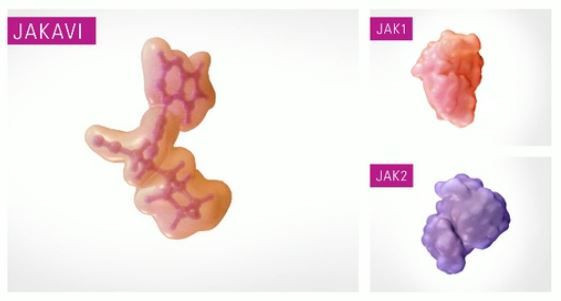Novartis Drug, Jakavi, Shows Promise In Treating Blood Cancer; Analysts Forecast Billion-Plus In Sales

Novartis announced on Friday that its drug Jakavi (ruxolitinib) improved two key measures of disease control in patients with polycythemia vera, a type of chronic, incurable blood cancer. The treatment helped patients maintain red blood cell volume and reduced spleen size in patients resistant to or intolerant of hydroxyurea. Currently approved in more than 55 countries for patients with myelofibrosis, Jakavi holds the potential to become a blockbuster drug with sales of more than $1 billion, according to Reuters.
"We plan to submit these data to worldwide regulatory agencies this year, as we seek to bring ruxolitinib to patients with polycythemia vera who are no longer responding to or are intolerant of prior therapy," Dr. Alessandro Riva, president, Novartis Oncology ad interim, said in the company's statement.
Jakavi is a JAK 1 and JAK 2 inhibitor — it prevents particular proteins from working correctly — and so directly targets the underlying mechanism of disease. In Novartis’ global study, 222 patients with polycythemia vera who were resistant to or intolerant of available therapy received either ruxolitinib (10 mg twice-daily) or best available therapy. The scientists were looking to see how many patients showed a controlled hematocrit without phlebotomy and how many showed a reduced spleen volume by 35 percent or more.
In cases of polycythemia vera, patients overproduce blood cells, which leads to a thickening of the blood and an increased risk of clots that may, in turn, cause serious cardiovascular complications, such as stroke or heart attack. Frequently patients have enlarged spleens and this, too, causes debilitating symptoms. Yet too often they may become intolerant or resistant to available therapies.
Ruxolitinib is the first selective JAK 1/2 inhibitor to demonstrate efficacy for treating polycythemia vera in a Phase III trial — when a drug is tested in humans for effectiveness as well as side effects. In this case, side effects included a decrease in blood cell count and infections, both of which required dose reduction or interruption. Jakavi is not recommended during pregnancy or while breast feeding, and women should avoid becoming pregnant during Jakavi therapy. Among the most common reactions are urinary tract infections, anemia, low platelets, hypercholesterolemia (high levels of cholesterol in the blood), dizziness, headache, and bruising. More rare reactions include weight gain, flatulence, and tuberculosis.
Polycythemia vera is a rare disease that occurs more often in men than women and is rare in patients under age 40. Researchers have found a connection to a gene mutation called JAK2V617F, yet they do not understand the cause of this mutation.



























